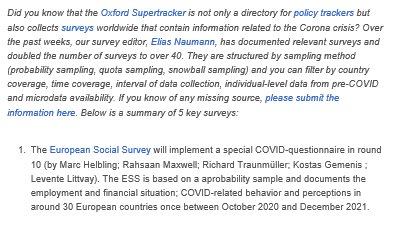Did you know that the Oxford #Supertracker is not only a directory of policy trackers but also collects surveys worldwide related to the #Corona crisis? Our survey editor @eliasnau has documented relevant sources. Today's update doubles the number of surveys covered to 64. 1/.. 

Data are structured by sampling method (probability sampling, quota sampling, snowball sampling). You can filter by country coverage, time coverage, interval of data collection, microdata from pre-COVID etc. supertracker.spi.ox.ac.uk/surveys/ 

1. @ESS_Survey by @MarcHelbling1 @rahsaanmax Richard Traunmüller @k_gemenis @littvay will be conducted via probability sampling and document the employment and financial situation; COVID-related behavior and perceptions in around 40 European countries.
europeansocialsurvey.org
europeansocialsurvey.org
2. The Mannheimer Corona-Studie by @PolEconReforms at the Universitiät Mannheim was conducted by probability sampling and focuses on the employment and financial situation; children and family; COVID-related behavior etc. in Germany with a daily interval.
uni-mannheim.de/gip/corona-stu…
uni-mannheim.de/gip/corona-stu…
3. Childcare issues throughout the COVID-19 pandemic by @Susanne_Kuger Jeffrey Anton, Sandra Hubert, Katrin Hüsken, Kerstin Lippert was conducted via probability sampling and covers the usage of public childcare services and parental employment in Germany.
dji.de/KiBS
dji.de/KiBS
4. The Understanding America study at @UAS_CESR @USCDornsife @USC is an existing panel based on a probability sample of the US population. The daily surveys cover employment and financial situation, family, health, COVID-related behavior and perceptions. covid19pulse.usc.edu
5. International Study on Compliance Behaviour of Students by Annelot Wismans (@ErasmusESE), @SrebLetina, Karl Wennberg, Ingmar Franken, Roy Thurik was conducted via snowballing and surveyed the behavioral response between April & May.
eur.nl/en/news/interv…
eur.nl/en/news/interv…
If you know of any missing source, please submit the information here. supertracker.spi.ox.ac.uk/submit-a-track…
Subscribe here to receive future updates:
supertracker.spi.ox.ac.uk/#subscribe
More info on the project:
Subscribe here to receive future updates:
supertracker.spi.ox.ac.uk/#subscribe
More info on the project:
https://twitter.com/LukasLehner_/status/1288008223107284992
• • •
Missing some Tweet in this thread? You can try to
force a refresh












